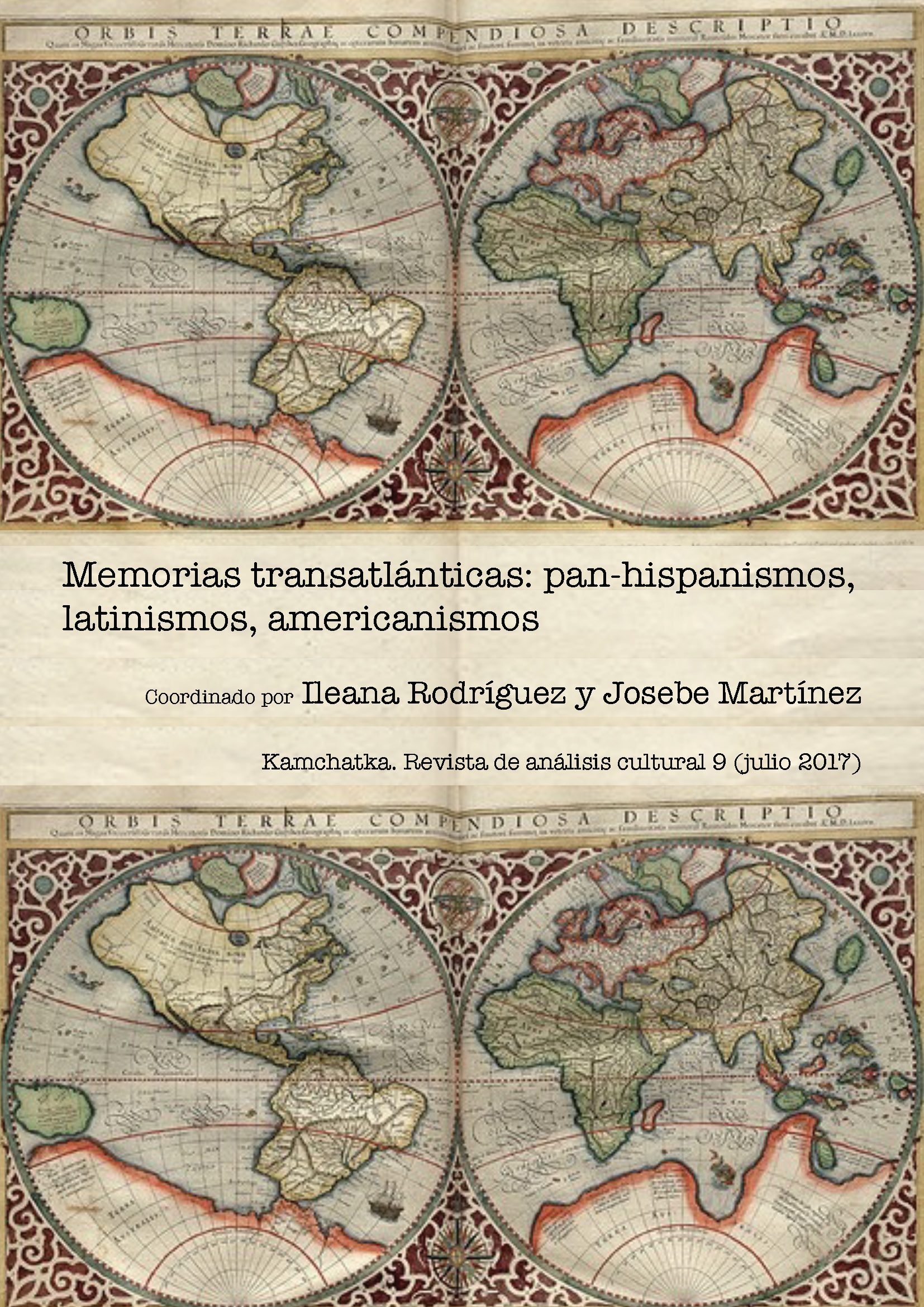Geopolítica, (de)colonialidad e identidad: la conciencia dividida de Rubén Darío / Geopolitics, (De)coloniality and Identity: the Divided Consciousness of Rubén Darío
DOI:
https://doi.org/10.7203/KAM.9.9552Keywords:
Rubén Darío, colonialidad del poder, de-colonialidad, geopolítica, conciencia dividida. Abstract
Abstract
Resumen: En este artículo, analizo los ensayos, crónicas y artículos periodísticos de Rubén Darío a través del marco de la colonialidad del poder y la colonialidad del saber desarrollado por Aníbal Quijano entre otros. Argumento que leyendo sus escritos políticos, observamos a un sujeto con una conciencia dividida. Por un lado, Darío reproduce el pensamiento eurocéntrico que caracteriza la colonialidad y por otro lado, critica y cuestiona tal paradigma. Para apoyar mi argumento, empleo las divisiones geopolíticas ‘Este/Oeste’ y ‘Norte/Sur’ para trazar las preocupaciones y pensamientos del poeta nicaragüense sobre los Estados Unidos y Europa. En otras palabras, examino desde dónde piensa Darío y cómo sus posiciones alinean con o se desvían de la colonialidad y/o la de-colonialidad.
Palabras clave: Rubén Darío, colonialidad del poder, de-colonialidad, geopolítica, conciencia dividida.
Abstract: In this article, I analyze Rubén Darío’s essays, chronicles, and newspaper articles through the framework of the coloniality of power and the coloniality of knowledge developed by Aníbal Quijano among others. I argue that reading his political writings, we observe a subject with a divided consciousness. On one hand, Darío repro-duces Eurocentric thinking that characterizes coloniality and, on the other hand, he criticizes and questions such paradigm. To support my argument, I use the geopolitical divisions ‘East/West’ and ‘North/South’ in order to trace the Nicaraguan poet’s concerns and thoughts regarding Europe and the United States. In other words, I examine from where Darío thinks and how his positions align with or deviate from coloniality and de-coloniality.
Keywords: Rubén Darío, Coloniality of Power, Coloniality of Knowledge, De-coloniality, Geopolitics, Divided Consciousness
 Downloads
Downloads
 References
References
Blandón, Erick. “Presencia de Rubén Darío en los discursos del mestizaje”. Chasqui 40.2 (2011): 171-183.
Castro-Gómez, Santiago (2005). La hybris del punto cero: ciencia, raza e ilustración en la Nueva Granada (1750-1816). Bogotá: Editorial Pontífica Universidad Javeriana.
Darío, Rubén (1924). Crónica política. Ed. Alberto Ghiraldo. Madrid: G. Hernández y Galo Sáez.
Darío, Rubén (1938). Escritos inéditos. Ed. E. K. Mapes. New York: Instituto de las Españas.
Darío, Rubén (1968). Escritos dispersos de Rubén Darío. Ed. Pedro Luis Barcia. La Plata: Universidad Nacional de La Plata.
Darío, Rubén (1972). Los raros. Costa Rica: Editorial Universitaria Centroamericana.
Darío, Rubén (1997). Quince prólogos de Rubén Darío. Ed. José Jirón Terán. Managua: Instituto Nicaragüense de Cultura.
Darío, Rubén (2004). “Rubén Darío: Las letras hispanoamericanas en París”. La caravana pasa. Managua: Academia Nicaragüense de la Lengua/Fondo Editorial CIRA.
Dussel, Enrique (2010). “Meditaciones anti-cartesianas: sobre el origen del anti-discurso filosófico de la modernidad.” Estudios transatlánticos postcoloniales: I. Narrativas comando/ sistemas mundos: colonialidad/modernidad. (Ileana Rodríguez y Josebe Martínez, edas.). Barcelona: Anthropos: 217-272.
Du Bois, W. E. B (2005). The Souls of Black Folk. New York: Simon & Schuster.
Grosfoguel, Ramón. “Transmodernity, border thinking, and global coloniality: Decolonizing political economy and postcolonial studies”. Eurozine (2008).
Jáuregui, Carlos. “Calibán, ícono del 98. A propósito de un artículo de Rubén Darío.” Revista Iberoamericana 64.184-185 (1998): 441-449.
Maldonado-Torres, Nelson. “On the Coloniality of Being: Contributions to the Development of a Concept.” Cultural Studies 21.2-3 (2007): 240-270.
Mignolo, Walter (2011). The Darker Side of Western Modernity: Global Futures, Decolonial Options. Durham: Duke University Press.
Normand, J. F. “Las ideas políticas de Rubén Darío.” Revista Iberoamericana 2.4 (1940): 435-440.
Quijano, Aníbal (2000). “Colonialidad del poder, eurocentrismo y América Latina”. La colonialidad del saber: eurocentrismo y ciencias sociales. Perspectivas Latinoamericanas. Ed. Edgardo Lander. Buenos Aires: CLASCO: 201-246.
Rama, Ángel (1970). Rubén Darío y el modernismo. Caracas: Universidad Central de Venezuela.
Ramírez, Sergio (2006). El señor de los tristes, sobre escritores y escritura. San Juan: La Universidad de Puerto Rico.
Rodó, José Enrique (1997). Ariel, Liberalismo y Jacobisnismo, Ensayos. México: Editorial Porrúa.
Salgado, María A. “Rubén Darío y la Generación del 98: Personas, personajes y mascaras del fin de siglo español.” Hispania 82.4 (1999): 725-732.
Schmitt, Carl (2003). The Nomos of the Earth in the International Law of the Jus Publicum Europaeum. New York: Telos.
Zavala, Iris M. (1992). Colonialism and Culture: Hispanic Modernisms and the Social Imaginary. Bloomington: Indiana University Press.
Zavala, Iris M. (2001). El rapto de América y el síntoma de la modernidad. Barcelona: Montesinos.
Downloads
Published
How to Cite
-
Abstract1310
-
Artículo (Español)861
Issue
Section
License
This journal provides an immediate free access to the content on the principle that freely make investigation available to the public, which promotes an increased global knowledge exchange.
Unless otherwise indicated, texts published in this journal are under the license Attribution-NonComercial 4.0 by Creative Commons. These texts may be copied, distributed and publicly communicated whenever the publication’s author and title are quoted and whenever they are not used for commercial purposes. In any case, intellectual property of the articles and its potential economic rights entirely belong to its authors.
The full license can be consulted on https://creativecommons.org/licenses/by-nc/4.0/. We encourage authors to disseminate papers published in Kamchatka. Journal of cultural analysis electronically, in institutional digital repository or in their websites.





